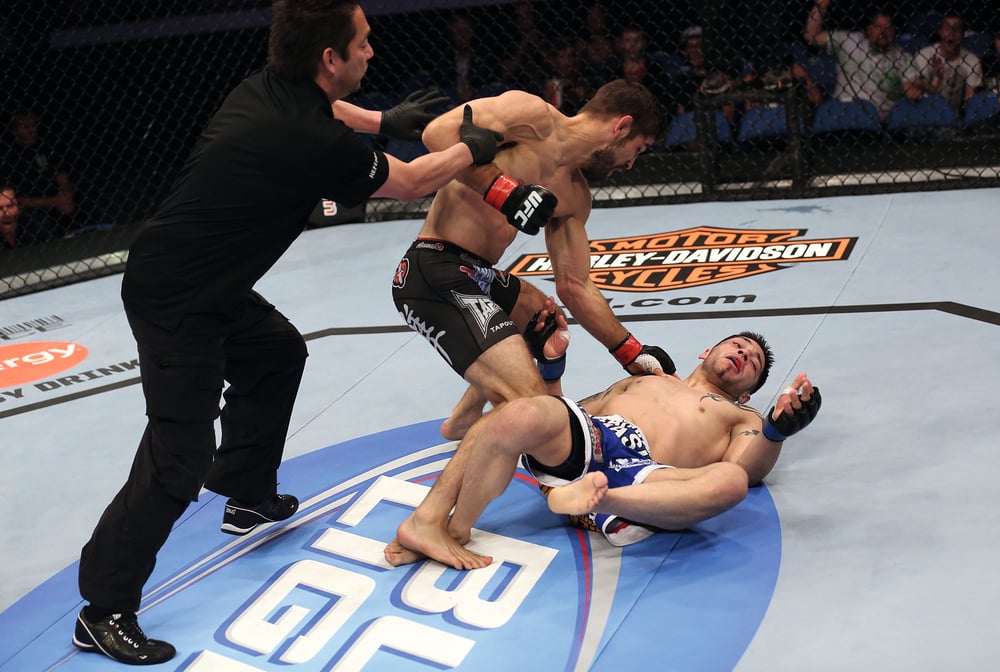
Issue 095
December 2012
Everything you ever wanted to ask about becoming an international MMA official
Mario Yamasaki
UFC referee
An MMA referee for 12 years, Mario has black belts in judo and BJJ and refereed the jiu-jitsu Pan-Am Games.
Over the last year I have had numerous questions from many readers who have expressed an interest in MMA and, more specifically, officiating. I’ve tried in many previous columns to answer some of the questions put forth, but I regret I haven’t been able to answer them all. So, this month, I’m keen to do a bit of house cleaning and answer as many of your questions as I can.
Mario, you’ve been around the sport of MMA since the beginning. Where is MMA heading?
The answer is easy: it’s growing daily and not going to stop. Thanks to the efforts of the UFC, MMA has truly reached global proportions. Originally, what we call modern MMA started as vale tudo in Brazil, where the reputations of clubs and gyms were put on the line in terms of combat. Legends, such as the Gracie family, were established and etched in history through these competitions. When the Gracies immigrated to the USA to spread their art and their fighting philosophy, the American sub-culture began to slowly embrace it. Thanks to the efforts of Dana White and Frank and Lorenzo Fertitta, who took a risk and developed the proper business model to surround the sport with, MMA has reached unprecedented heights compared to its humble beginnings. It is no longer just a North American product, and in the next few years I believe we’ll see it impact on almost every country in the world.
What changes have you noticed in the sport?
In preparing for my courses, in which I teach other officials, I often go back and review old videos of past fights. In reviewing the videos you get an understanding of how the sport has evolved. The technical skills of the athletes have improved tremendously. In the past we had more distinct skill-sets. By that I mean the separation between a striker and a grappler was clearer. Where the sport is today, you have more of what we call a true mixed martial artist – someone who can function at any range of combat and be an equal threat as either a striker or a grappler. It can make the job as an official a bit more challenging because now a fighter can unload a plethora of techniques and an official has to be prepared for that.

Can an official (either a referee or judge) make a full-time living from MMA?
I get asked this question a lot. I always tell every official that we do this more as a hobby. Do we get paid? Of course. But we don’t get paid enough to ditch our day jobs. The reason you should be getting involved in the sport as an official shouldn’t be for the money, because chances are you are not going to get rich off of it. I came into the sport of MMA because I was raised in a family that was heavily involved in combative sports. It was something I enjoyed doing. You should be involved in the sport because you enjoy doing it and have something to offer.
What are some of the problems that are affecting MMA today?
Having been around the sport most of my life and watched it grow. One of the things that still concerns me is an influx of people coming into MMA who know nothing about the sport. As with anything that becomes popular, you tend to attract a variety of people to it. This is generally a good thing. However, it has been a problem for MMA. I’ve been around many regulators and commissions, who tend to be government-appointed people and have limited knowledge of the sport. Keep in mind, many of these people are responsible for the governance of the sport in terms of rules, regulations, training, etc. These are the individuals who critique the officials at the end of bouts and try to offer guidance. You need to have individuals involved, especially in terms of regulation, who have the knowledge and skills to understand it at an elite level, and have something to offer. I believe this is a frustration with many people involved in MMA, some who have been around for a while and have contributed to its growth.
What do you enjoy most about being an official?
I like the fact you are always challenged. You put your skills and knowledge on the line in every fight. I like the fact we as referees can make a difference and keep the athletes safe. I always go back to my guiding philosophy, which is that I care about the fighters as I’ve grown up in the fight community.
There is a camaraderie that exists at most fights, in that we are together as a team: the officials, the doctors, and the commission. Many of us have worked together before and when we get together and see each other at events it is like a reunion of sorts. There is also an energy that exists at a live event that has to be experienced to be fully understood. It charges you and sustains you, and you can become addicted to it. If you are reading this as an official – or perhaps even a fan who has attended a big event – you understand what I’m talking about. These are the things I enjoy.
...









